“This is America!” Alan Graham screams into my ear.
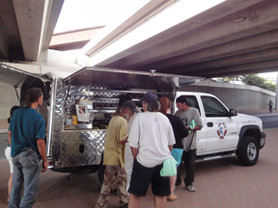 We are standing below an elevated section of Highway 35, a few miles south of downtown in Austin, Texas, and I can barely hear him, as the noise around us is cacophonous. The pavement beneath my feet vibrates, and it feels like I’m at the edge of a cyclone, with a powerful whirring-sucking energy that could easily draw me in, up, and away. Highway 35 stretches from Mexico all the way to Canada. The busiest thoroughfare in the United States, its single most-trafficked section is between San Antonio and Austin. Over a half a million cars go roaring by here every day on eight lanes of traffic that are only a few feet above my head.
We are standing below an elevated section of Highway 35, a few miles south of downtown in Austin, Texas, and I can barely hear him, as the noise around us is cacophonous. The pavement beneath my feet vibrates, and it feels like I’m at the edge of a cyclone, with a powerful whirring-sucking energy that could easily draw me in, up, and away. Highway 35 stretches from Mexico all the way to Canada. The busiest thoroughfare in the United States, its single most-trafficked section is between San Antonio and Austin. Over a half a million cars go roaring by here every day on eight lanes of traffic that are only a few feet above my head.
A few minutes earlier, Graham, who founded Mobile Loaves and Fishes (MLF), a fleet of catering trucks delivering food each evening to Austin’s poor, had maneuvered one of his “miracles on wheels” up onto a sidewalk under a highway overpass. There was movement deep within the shadows beneath this enormous concrete structure, as maybe a dozen men came forth, blinking as they encountered sunlight.
“They live here, if you can imagine,” Graham hollered. “Sleep deprivation is a big factor when you’re homeless.”
Graham, age 55, is modest of physical frame, but has an outsized, jolly personality. Sporting a downy white mustache and beard, he looks a little like Santa Claus, that is, if Santa watched his weight. Graham speaks in a Texas drawl, and aims wise cracks towards the corners of his mouth, so his zingers truly do come out sideways.
On this scorching July afternoon – the hottest time of day in Austin is between 3 and 6 p.m. – Graham is jazzed up by his knowledge of this pocket of poverty under Highway 35, like it’s a super-special fishing hole only he knows about. Instead of nabbing sea bass or trout, however, Alan is a fisher of men. He grabs hold of the slightly wobbly-looking souls who emerge from the dark. Pumping their hands, he claps them on the back, and offers words that combine fraternal camaraderie with tough love.
One guy has a frayed and stinky ace bandage wrapped around his left foot, which is massively swollen. Alan asks how long it’s been like this. Is it maybe sprained or broken? These questions are too complicated for the man to follow. Alan lets the matter drop, but not before making sure the guy is given a clean pair of socks.
“Can you eat an apple?” he asks another guy. “Do you have enough teeth? Smile, and let me see.”
What happens next is horrible to witness. The man grins, and he doesn’t possess a single tooth, only discolored gums.
“You’d better stick with a banana,” Alan shouts. He’s matter-of-fact, and seemingly unfazed by this shocking transaction.
Alan is a fisher of men. He grabs hold of the slightly wobbly-looking souls who emerge from the dark.
I’d come to Austin to learn more about Graham, and the hundreds of volunteers who stock his fleet of catering trucks before driving them out to parks, street corners, parking lots and highway overpasses. MLF has 17 trucks in six cities and five states (11 vehicles are in Austin.) Food sufficient to feed 100 people is loaded onto one side of the truck, and on the other, a collection of used running shoes, miniature bottles of shampoo, soap packets, tampons, combs, and socks – lots and lots of socks.
“Socks are a whopper for homeless people,” Graham explains. “A new, clean pair can brighten up your day, hell, your month!”
It’s a humble fact Graham could quite easily never have learned. For most of his career, he was a successful real estate developer, specializing in the construction of air cargo hangars at airports around the United States.
“I loved my business. We were making pots of money. I was building huge storage facilities all over the place, but my biggest, my baby, was right here in Austin. The company I founded has now expanded worldwide,” he said.
In 1996, Graham was talking to a friend who lives in Corpus Christi, and she mentioned a group of people who’d pooled their resources to start a new soup kitchen there. As he tells it, while listening to her, Graham suddenly saw a vision of a catering truck – one of those vehicles with quilted stainless-steel sides you imagine pulling up to a factory gate – as a means of food distribution. “I had this radical idea we could go to where hungry people are, rather than forcing them to arrive at some centralized, downtown location. There’s nothing efficient about it, but the idea of a catering truck just grabbed me by the throat!”
Alan and a group of his buddies went out for the first time in October of 1998, driving one of their own mini-vans. “We called ourselves the Six Pack, because there were six of us, but also because after we did one of our food drop-offs, we’d all go chug a six-pack, or two, of beer.”
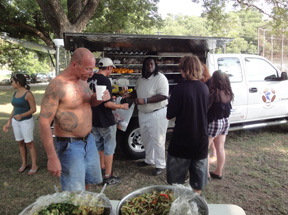 The men quickly realized they didn’t know what they were doing. Most members of the Six Pack attended Austin’s St. John Neuman Catholic church, which sits in one of the most affluent neighborhoods in Texas. (“We have billionaires, but they don’t know jack shit about serving the homeless,” Graham observed.) So they started talking to the church’s custodian, a gentleman named Houston Flake. Born to homeless parents, Flake was a former drug addict, and had done time in prison. “Houston was our eyes on the street. He’d lived out there, he knew where folks set up their camps, and where they gathered,” Graham explained. “Soon enough, we had 120 locations across Austin, where we could drive up and find hungry people, any night of the week.”
The men quickly realized they didn’t know what they were doing. Most members of the Six Pack attended Austin’s St. John Neuman Catholic church, which sits in one of the most affluent neighborhoods in Texas. (“We have billionaires, but they don’t know jack shit about serving the homeless,” Graham observed.) So they started talking to the church’s custodian, a gentleman named Houston Flake. Born to homeless parents, Flake was a former drug addict, and had done time in prison. “Houston was our eyes on the street. He’d lived out there, he knew where folks set up their camps, and where they gathered,” Graham explained. “Soon enough, we had 120 locations across Austin, where we could drive up and find hungry people, any night of the week.”
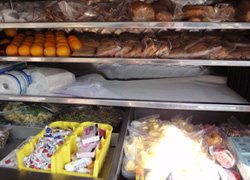 A typical meal served from a MLF truck is a peanut butter and jelly sandwich, a hard-boiled egg, some potato chips, and maybe a piece of slightly stale, off-season candy. (In July, trucks were offering chocolate Easter bunnies.) Shortly before I traveled to Austin, I spoke over the telephone with Graham’s wife, Tricia, and she was enthusiastic about my cooking whatever I wanted. I suggested Meat Loaf sandwiches; and maybe some green beans, with avocado, and roasted red peppers?
A typical meal served from a MLF truck is a peanut butter and jelly sandwich, a hard-boiled egg, some potato chips, and maybe a piece of slightly stale, off-season candy. (In July, trucks were offering chocolate Easter bunnies.) Shortly before I traveled to Austin, I spoke over the telephone with Graham’s wife, Tricia, and she was enthusiastic about my cooking whatever I wanted. I suggested Meat Loaf sandwiches; and maybe some green beans, with avocado, and roasted red peppers?
“Oooo,” Tricia said.
“And German potato salad, you know, the kind that’s really vinegary and mustardy?” I continued.
“Oh, Lordy-Lord Jesus!”
“How ‘bout some home-made chocolate chip cookies?”
“Bring it on, baby!” Tricia was shrieking by now. “Bring it on!”
It was like we were having phone sex – an observation I later made to Tricia, and which she found highly amusing. Both the Grahams are wonderfully down to earth.
When I arrived at MLF headquarters, I got right to work in the kitchen, which has a huge stainless steel table at its center. Tall shelves line the room on either side, and a large portion of this shelving space is devoted to five-gallon tin cans full of peanut butter, and glass jugs of Concord grape jelly. There were also countless boxes of Ziploc bags. Everything edible that goes out on one of the MLF trucks is “pre-portioned,” and enclosed in one of these plastic pouches.
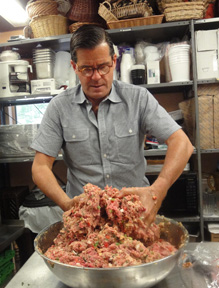 I don’t think there’s anything quite as satisfying as making a meat loaf. Combining beef, veal, pork, diced onion, garlic, parsley, bread crumbs, egg, and milk – especially if you’re cooking enough to feed 200 people – is nearly impossible to do with a spoon. You’ve got to use your hands to mix it up, and form the mess into loaves, then wrap them in bacon. When I had twenty of these loaves all lined up on baking sheets, it was an unusually good feeling. As the meat cooked, the aroma lured people from other parts of the facility – secretaries from the front office; auto repair guys that work on keeping the MLF trucks operational. I made sure to cut them nubbins off the ends, when the meat loaves came out of the oven.
I don’t think there’s anything quite as satisfying as making a meat loaf. Combining beef, veal, pork, diced onion, garlic, parsley, bread crumbs, egg, and milk – especially if you’re cooking enough to feed 200 people – is nearly impossible to do with a spoon. You’ve got to use your hands to mix it up, and form the mess into loaves, then wrap them in bacon. When I had twenty of these loaves all lined up on baking sheets, it was an unusually good feeling. As the meat cooked, the aroma lured people from other parts of the facility – secretaries from the front office; auto repair guys that work on keeping the MLF trucks operational. I made sure to cut them nubbins off the ends, when the meat loaves came out of the oven.
I don’t think there’s anything quite as satisfying as making a meat loaf.
Then I got busy making potato salad, and green bean salad. Tricia pitched in, too, and while we cooked together, she spoke quite openly about what a shock it was, initially, to have her “high-rollin’” executive husband suddenly decide to work with the homeless. His zeal was not easy for her and, at first, Tricia resisted. “Alan is much better about throwing things away than I am,” she said. “He wanted to get rid of our wedding china at one point, claiming we didn’t use it enough to need it. I told him he could just forget it! I wasn’t ready to do that.”
She looked up at me and asked, “Was I being unreasonable?”
“Absolutely not,” I replied.
Tricia smiled, but I sensed I’d given the wrong answer.
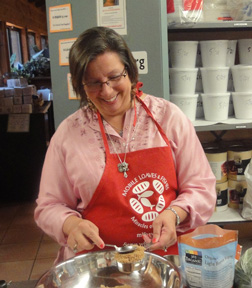 Continuing her story, Tricia explained that once she’d gotten adjusted to the new reality, she didn’t need as much as she’d once thought. Instead, this life of helping others was much, much more rewarding to her than what she’d known before.
Continuing her story, Tricia explained that once she’d gotten adjusted to the new reality, she didn’t need as much as she’d once thought. Instead, this life of helping others was much, much more rewarding to her than what she’d known before.
“I’ve still got my wedding china, and I still don’t use it,” she said, shaking her head.
Around this time, other food preparers arrived. When I saw what a science these folks have turned making a PB and J sandwich into, well, I was amazed. The secret is to fill a gallon-size plastic bag with grape jelly, and cut a small hole in one of its bottom corners, thus creating a sack like pastry chefs use. This allows you to squeeze out a blob of grape jelly at lightening speed onto the bread someone else has smeared with peanut butter. A mother and her two teenaged daughters banged out 200 sandwiches in half an hour.
I was touched by the diligent demeanor of these young ladies. How good of them, I thought, to come along, and be such team players. Yes, it is, but many of Austin’s junior high and high schools have a Community Service Requirement, whereby it is mandatory for all students to volunteer a few hours a week to a local non-profit organization. Turns out quite a few decide making peanut butter and jelly sandwiches is a relatively painless way to do their “C.S.R.”
Mandatory volunteerism – it’s my new favorite oxymoron.
Around 5 p.m., Alan shows up in the kitchen, and punches me on the shoulder. It was time to head out on a food delivery. Did I mention that Austin, in summer, is hot? I’d been baking meatloaf all afternoon in an unventilated kitchen, but this was a cool breeze in comparison to being outside. It felt like a steam iron was being pressed down on top of my head. Four of us piled into one truck. I was up front, in the passenger seat, seated next to the driver, Bruk Keener. In the back were Alan, and his daughter. Taylor Graham is 22, a junior at the University of Texas who hopes someday to work in journalism. Taylor stared at my notebook, and watched with great interest as I jotted away.
Rush hour traffic was fierce. Idling along, I had time to chat with Bruk, who describes himself as the “official grunt” of MLF, and speaks with great enthusiasm about his many years of
living on the streets. Oddly, he even smiles at these memories, as if he were recalling his high school prom, or the trip he once took to Orlando.
“How do you explain how you ended up homeless?” I asked.
Bruk didn’t flinch, or deliberate. “I made poor choices,” he instantly replied. “I started hanging out with the wrong sorts of people. I was pretty bad. Both me and my wife was. She had a reputation for being crazy-wild when she was drunk. There was many a time when I sat up all night, smokin’ crack and chuggin’ beer, right there, in that park.”
I look in the direction of Bruk’s outstretched finger. He pointed to a rubble-strewn field, surrounded by a chain-link fence, behind an elementary school. At the field’s center, was a rusted-out swing set, tilting at such a precarious angle, it’s ready to topple over. Not exactly a convivial spot.
Bruk is a handsome guy, perhaps 35, with shaggy brown hair, bright eyes, and a dazzling smile. It’s hard to imagine him as a crack addict, and I tell him so. Bruk acknowledges my compliment in a way that lets me know it’s not the first time he’s heard it. Turns out Bruk is now a motivational speaker, who addresses churches and other gatherings around Austin, to raise money and awareness of MLF.
“Me and my wife, we mingle with the crowd beforehand, like we’re invited guests. Then I get up and say, ‘you know that guy who you used to pass by on the sidewalk, the one with the matted and dirty hair, the one who was drinkin’ and stinkin’? Well, folks, that was me.’ People say to me, ‘Oh, you were a hobo!’ I tell them I don’t like that word. I prefer to say feral humans.”
Bruk laughs uproariously at this.
We arrive at a subsidized housing development, a U-shaped arrangement of long, low buildings, what might once have been a low-budget motel. Before we’ve even rolled to a stop, there is a line of 30 or 40 people, mostly children. I get the impression their mothers are sitting back in their apartments, maybe watching TV, and they’ve sent their kids out to act as a personal food delivery service. The kids are mostly black, with a few Latinos thrown into the mix. As each child comes forward to the truck, I ask their name, and tell them mine. In short order, I serve Aisha, Dionesia, Diamon, Alfonso, Pablo, Lavacca, Clytemnestra, Fonecia, two Shavons (one a boy, the other a girl), and three little boys named Jesus. The kids are all fairly well-behaved. It’s the adults who pout and beg, until I relent, and give them an extra meat loaf sandwich, or another chocolate chip cookie.
“No matter what our circumstances in life, the only real question is, are we ready to learn something from it?”
After we make one more stop, at a blighted corner near an abandoned gas station, our truck is cleaned out. I go to stand by Bruk, eavesdropping while he chats with an unnervingly skinny black man named Edwin. He is hollow-cheeked, with eyes that are buzzing black dots. Edwin, I guess, is stoned out of his gourd. He’s making a great effort to speak, as if he’s shouting from the bottom of a deep hole, yet by the time Edwin’s words are formed, they are barely audible. I’m surprised by his erudition, though. Leaning in, I hear him say, “No matter what our circumstances in life, the only real question is, are we ready to learn something from it?”
At another moment, Edwin, knowingly or not, invokes Charles Dickens’ A Tale of Two Cities. “To be homeless, in Austin, is the best of times, and the worst of times. You find your people out there on the streets, you really do,” he said. “If someone’s got something, and someone don’t, well they gives it away. This is very common in the homeless community. It ain’t no thang.”
A teenaged girl arrives. She’s quite upset there is no food left. This deprivation appears to be her breaking point. She drops her face into her palms, and begins to cry, her torso heaving with convulsive shudders. “It’s alright, sister. Here you go,” Edwin said, as he handed her a bag of food he’d collected for himself a few minutes earlier.
“It used to be you would see mostly middle-aged people out on the street, but now there are also a lot of young people.”
It is terribly, terribly hot. Sunblock is stinging into my eyes. I look away from Edwin and the girl, as I blink back tears.
When we get back into the truck, Alan is driving and Bruk, from the backseat, begins to reminisce again. “Me and Edwin? We was both on the street, and we used to get high together. Somehow I got clean, but Edwin still suffers from being a drug addict.” After a pause, Bruk continued, “Edwin had this ring, with Hebrew letters on it, that said something like, ‘wherever you are, I will always be with you.’ He sold it to me once for $5, so he could get a fix. I still have it, that ring. I’ve always thought I would give it back to him when he’s no longer using. I guess the time ain’t yet come.”
We drove in silence for a few minutes.
“It used to be you would see mostly middle-aged people out on the street, but now there are also a lot of young people,” Alan finally said. “They are disenfranchised. I mean if you are smoking weed all the time – and believe me, I’ve smoked plenty of weed in my day – you are not terribly productive. I mean, let’s face it, very little greatness comes out of drug use. Have you ever done anything that you wanted to hang your reputation on, anything particularly brilliant, when you were stoned?”
Alan turns to stare at me. I belatedly realized this was not a rhetorical question.
“No,” I reply.
“Damn right you haven’t, and I haven’t either. But just try to explain that to these kids!”
At first, I’m embarrassed for Graham because he’d so casually acknowledged, even boasted about, the extent of his recreational drug use when his daughter, Taylor, was sitting in the truck’s back seat. Upon further reflection, though, I realize by speaking as he did, Graham had actually communicated a more important point: being stoned is a waste of time.
After we get back to MLF headquarters, I talk with Taylor for a few minutes.
Like her mother, she remembers well the at-times awkward transition as her father went from being a rich businessman to a social worker.
“Ohmigod,” she told me. “I would be at school, and it would be my Dad’s day to pick me up after classes. I’d see the Mobile Loaves and Fishes truck come rolling up in front of all my friends. It was, like, ohmigod, please just let me die right now! I mean, I was young. And stupid. And selfish. Now I’m proud of my parents, and all the people they’ve helped. I brag to my friends in college about them, and the lives that my Mom and Dad have transformed. I think it’s cool to be Alan Graham’s daughter. But I’m not going to lie to you; I wasn’t at this place back when I was in high school.”



